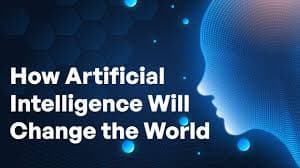
How AI is Changing the Future of Work
By Sumit Chandra•
Artificial Intelligence, often called AI, has gone from being a futuristic idea to an everyday reality. Today, AI tools help us write emails, recommend shows on streaming platforms, and even assist doctors in diagnosing diseases. But one of the biggest impacts of AI is on the way we work. In 2025 and beyond, AI is not just changing jobs—it is transforming entire industries and the skills we need to succeed.
AI is making routine tasks faster and easier. In offices, tools like ChatGPT and other AI assistants help write reports, summarize data, and answer questions in seconds. In marketing, AI designs ad campaigns, analyzes trends, and creates content. In customer service, AI-powered chatbots solve simple issues instantly, allowing human agents to handle more complex problems. This means companies can work more efficiently while employees focus on creative and strategic work instead of repetitive tasks.
However, many people worry that AI will take away jobs. It is true that some roles may become less common, especially jobs that are based only on repetitive work like basic data entry. But history shows that every major technology creates new opportunities. Just like the invention of computers created jobs that did not exist before, AI is leading to the rise of new careers. Jobs like AI trainers, prompt engineers, and AI ethicists are now in demand—roles that were unheard of a few years ago.
Another big change AI brings is the rise of hybrid workplaces. With AI tools handling scheduling, reporting, and task management, remote work has become easier than ever. Employees can collaborate across the world in real time with AI helping manage the workflow. This flexibility benefits both companies and workers, allowing access to global talent and better work-life balance for employees.
AI is also reshaping education and skill development. Instead of learning in traditional ways, people are using AI-powered platforms for personalized training. These tools can analyze your strengths and weaknesses and create learning paths designed just for you. In the workplace, this means employees can upskill quickly and stay relevant in a fast-changing job market.
Of course, with all these benefits, there are challenges too. Questions about ethics, bias, and data privacy are more important than ever. Companies and governments will need to make sure AI is used responsibly and fairly. Employees will need to learn how to work alongside AI, understanding both its power and its limits.
The future of work will not be humans versus AI—it will be humans and AI together. People who know how to use AI tools effectively will have an advantage in nearly every field, from business and healthcare to design and engineering.
In the coming years, AI will continue to evolve, creating new opportunities and new responsibilities. The key is to adapt, stay curious, and keep learning. AI is not just a trend—it is the future. And those who embrace it will be ready for a workplace that is smarter, faster, and full of possibilities.